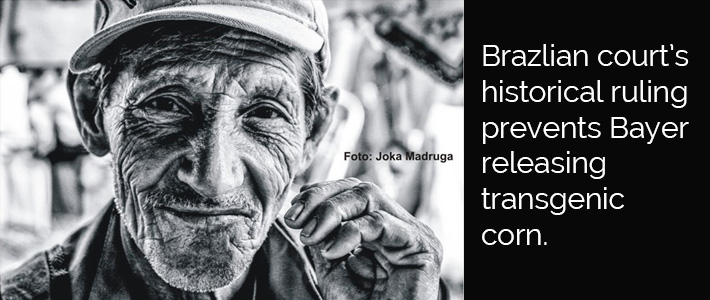
Decision creates new legal precedent and may serve to force review of all the other commercial releases of GMOs in Brazil.
In historic ruling, Brazilian court prevents the release of transgenic corn from Bayer
Terra de Direitos, 13 Mar 2014
[GMWatch/Google translation from Portuguese original]
* Decision creates new legal precedent and may also serve to force review of all the other commercial releases of GMOs in Brazil, since in no case have companies conducted risk assessments in all biomes of the national territory.
On Thursday 13 [March], judges of the Federal Court of Appeals of the 4th Circuit - TRF4 - unanimously decided to annul the decision of the Technical Committee on National Security (CTNBio) which released the transgenic Liberty Link corn from the multinational Bayer. The decision was made on the grounds of lack of studies assessing risks from GM. The court was ruling on a Civil Action brought in 2007 by Terra de Direitos [Land Rights], the Brazilian Institute for Consumer Defence (IDEC) and the National Association of Small Farmers and AS- PTA, which challenged the legality of the commercial release of Liberty Link.
The rapporteur of the case, Federal Judge Candido Silva Alfredo Leal Junior, read excerpts from his long ruling for about an hour and a half, supporting the need for studies on the negative impacts of GMOs in all biomes. According to Leal Junior, not enough studies have been carried out in other countries, because the law requires that the decision of CTNBio is supported by studies that assess the impact of GMOs on each of the major biomes. In addition, the judge ordered CTNBio to develop standards to enable society to access documents in the [industry] dossier processed by the Commission, allowing a qualified participation of the population in the process of trade liberalization.
Federal judges Marga Inge Barth Tessler and Vivian Josete Pantaleon Caminha, as well as the judge Carlos Eduardo Flores Thompson Lenz, fully followed the position of the rapporteur judge, highlighting the excellence of the vote. Flores Lenz, who had voted in the previous trial for the release of transgenic corn, changed his position, emphasizing that the rapporteur's analysis will make history and create a new paradigm for the interpretation of the matter.
With this decision, the Bayer GM maize can not be marketed in North and Northeast regions of Brazil, where technical studies on environmental risks to human health arising from the GM have not been carried out. The decision creates new paradigms in legal matters and may also serve to force the review of all other commercial releases of GMOs in Brazil, since in no case have companies conducted risk assessments in all biomes of the national territory.
According to Fernando Prioste, lawyer for Terra de Direitos in the case, the decision will have a major impact on the issue because it forces studies to be carried out to assess risks in all biomes and forces CTNBio to bring transparency to the process of release of GMOs. "Today's ruling deserves detailed study because it covers the topic in depth, analyzing the legal aspects combining the social and economic consequences of the release of GMOs in Brazil for future generations."
Prioste points out that despite the court's firm position on the matter, companies have to appeal to the High Court and the Supreme Court in order to further extend the debate.
"After ten years of commercial release of GM crops in Brazil, the debate over the issue has intensified in more complex ways, exposing the weakness of pesticides and GMO-based agriculture. The court decision today is an important element that will add to the people's struggle for a model of agriculture based on agroecology, which guarantees rights for farmers and healthy food without pesticides for the population," said the lawyer for Terra de Direitos.









